The answer to the question “Is Depression a Physical Illness” is a simple YES. Treatment for depression needs a two-pronged approach. It needs to be dealt with on a physical as well as psychological level.
Many people tend to think of depression as an ’emotional’ problem but it’s actually also a physical illness. I remember when the doctor told me that I was suffering from depression I was horrified! After all, who wants to acknowledge that they have a mental illness. Maybe you reacted the same way. A diagnosis of depression was far more acceptable to me once the doctor explained how depression is a physical illness.
I found this diagram very helpful in understanding the cycle of depression. I will give an explanation of each stage which will definitely help answer the question “Is Depression a Physical Illness?”
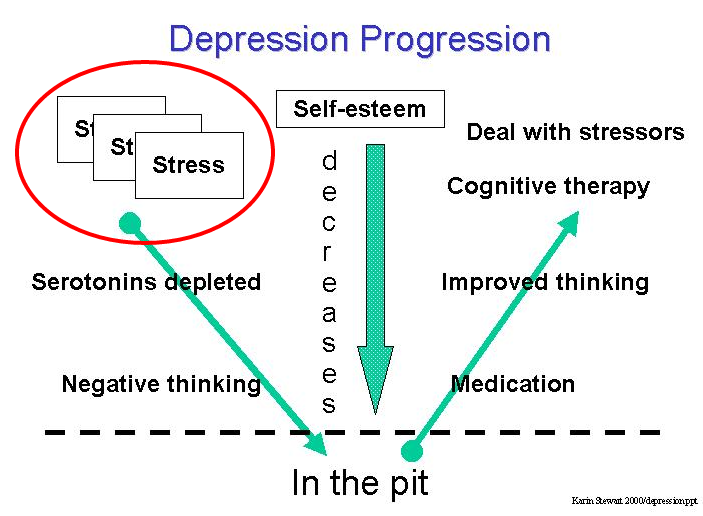
Work your way around the diagram anti-clockwise, starting in the top left corner with STRESS.
STRESS
Depression always starts with stress and is also associated with loss. It can be a very real loss like the death of a loved one, or the loss of a job. At times, it’s an internal loss, like a loss of self-esteem. Stress is not the same for two people. An event that one person finds hugely stressful might cause no stress whatsoever to another. Because of this we can conclude that stress is caused by the way we view the situation. It’s our perception of what is happening that causes our stress.
Cognitive therapy is essentially a therapy of your thoughts and is regarded as the most successful therapy for depression. In my experience, I have to agree with this. In cognitive therapy, a very important premise is that it’s not the situation or event that causes stress, but rather it’s the personal meaning attached to the event, that causes the stress.
Don’t throw your arms up in disbelief, or even horror! Let me give you some examples of what I’m saying right here.
- Are you a perfectionist? Many perfectionists suffer from depression as their standards are impossibly high and are therefore never met. The result? A constant feeling of failure. Do you recognize the perfectionist motto: ‘If you can’t do it perfectly, don’t do it at all’? Often this fear of failure stops you even trying, as mistakes are a train smash. and the stress builds up! A ‘non-perfectionist’ regards a mistake as part of life and a part of life’s learning process. It’s really okay to make mistakes because how else do we learn.
- Are you a people appeaser? People appeasers are also very prone to depression as the mood is dependent on other people’s approval. This is actually an impossible situation. You can’t please everyone and it places the responsibility for your moods outside of your control and into the hands of others. The result is that every time someone disapproves of you, you fall into the downward spiral of depression.
Some examples
You have two salesmen and neither of them closes a particular sale. The one salesman says ‘On, darn it, I’m useless as a salesman, I’ll never make it, I may as well just give up‘. How is this man going to feel? With thoughts like that, I have no doubt he’ll feel down in the dumps. On the other hand, the other salesman might say ‘Well I can learn from that experience. I’ll polish up on my sales techniques so I’ll do better next time’. These thoughts certainly won’t pull him into depression.
Last one! You phone an acquaintance, leave a message and the call isn’t returned. What goes on in your mind? Perhaps thoughts like ‘what did I do wrong? My so-called friend obviously doesn’t like me if they don’t bother to return my call and if they can’t be bothered to phone me – well I won’t bother either!‘ These thoughts will lead to a loss of self-esteem and will make you feel down. Ask yourself if you’re really sure that these thoughts are based in reality. You won’t know if you don’t check them out.
Or maybe you think along these lines. ‘I wonder if he got my message. Maybe he’s busy or could have forgotten. Anyway, let me give him a ring to find out.’ These thoughts won’t lead to depression and internal stress as they are grounded in reality.
Our thoughts determine our mood
From these examples it should be clear that happy thoughts lead to a happy mood. Sad thoughts lead to a sad mood. Your thoughts determine your mood, not the other way round. The difficulty is that generally we are unaware of our thoughts as our thoughts are automatic.They just pop into our heads. Have you ever asked yourself where on earth a particular thought came from? We don’t choose our thoughts, they come into our heads automatically in response to particular situations. My article entitled Cognitive Therapy deals with this in depth.
WHY STRESS LEADS TO DEPRESSION
The reason is very simple. Stress uses up the brain’s thinking chemicals. You might have heard of serotonin, that’s one of the brain chemicals that gets used up when a person is stressed.
How the thinking process works
- Thoughts travel as an electrical impulse along one nerve to a synapse.
- At the synapse, the thought needs to ‘jump’ across to another synapse to continue its journey along another nerve.
- The brain chemicals between the synapses facilitate this thought ‘jumping’. Let me explain with an analogy. Imagine the ‘thought’ as a canoe on one side of the river. With insufficient water in the river, the canoe can’t cross properly. It could even get stuck in the middle. The same principal applies to our thoughts. Stress depletes ‘the serotonin river’ running between the synapses and the thought cannot cross properly. These thoughts are a bit like a radio that’s badly tuned. There’s nothing wrong with the original broadcast but it reaches you all ‘cracked up’! Basically the thinking process short-circuits and the thoughts are not transferred properly.
This diagram gives a more ‘medical’ illustration of the process.
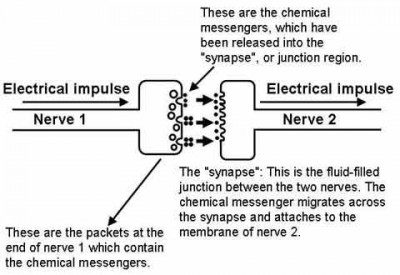
Normally the body replenishes the brain chemicals between stressful events. A bit of time-out or stress-free activity can work wonders. However when there is no time for chilling out and the stress never lets up, it’s time for medical treatment. The person is now clinically depressed.
NEGATIVE THINKING
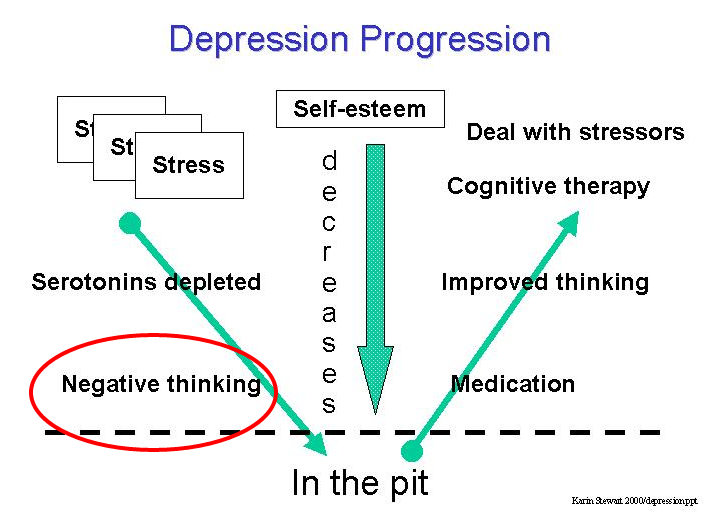
The symptom of depression is negative thinking. Feelings of being worthless, unlovable and guilty are common. Because these symptoms are common to all depressed people, it really does indicate that these thoughts have a physical cause. These negative thoughts are the result of insufficient serotonin, rather than a genuine worthlessness as the thoughts would have you believe. These thoughts are not based in reality and are caused by a lack of serotonin.
The negativity showed by a depressed person often seems uncharacteristic and this in itself should alert one to the fact that the person is ill. The brain is ill. The brain is just an organ of the body like every other body organ and can get ill. Somehow we accept that all the other body organs get ill, but not the brain. We expect the brain to work perfectly all the time. However, to successfully overcome depression you need to accept the fact that the brain is ill and needs treatment. Swallow your pride, go to your doctor and get treatment!
IN THE PIT
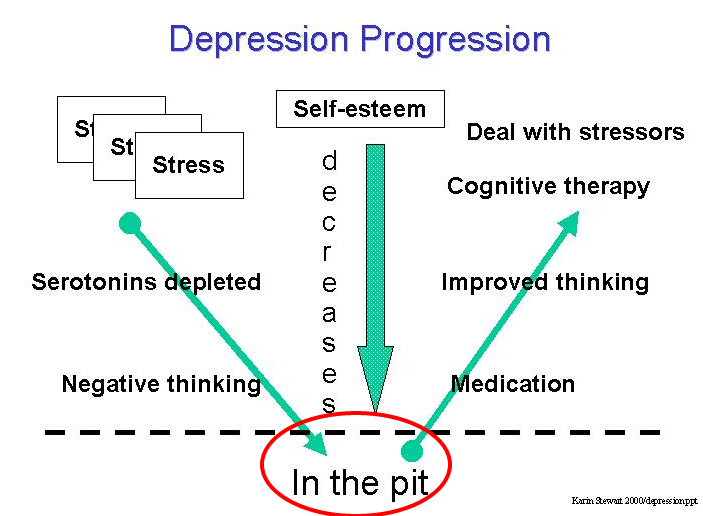
A person experiencing severe depression often refers to being In the Pit or in a dark tunnel. If you’ve been there, you know what I’m talking about and it’s definitely a bad holiday destination! You won’t want to return there – never ever!
The pit is all-consuming. Life feels impossible and suicidal thoughts can arise as the only escape. And before you even think that your family would be better off with you dead, throw that dreadful thought out of your head! That type of thought is not based in reality and is part of the illness. You can ask your family if they agree with your thought. They won’t. It’s an accepted fact that depressed people are actually very loved, but they just don’t see it.
At times it can feel as if all the ‘bad things’ in life are targeting you like a lightning bolt!
Story of ‘In the Pit’. I wrote this to help anyone unfamiliar with the ‘Pit’ but wants to understand what it’s like. Share it with your loved one but make sure they’re listening first. Ask them to first switch off the TV! Let them close their eyes while you read so they really get the picture.
‘Imagine yourself in a dark pit, you don’t know how you got there. You just seemed to land on a slippery slope and down you went. It’s very scary, nothing makes sense, and you can’t see anything. Thoughts bombard you from within, a bit like bats flying round you in a dark cave … you’re worthless, you’re guilty, you’re unlovable, life’s hopeless.
You become restless and irritable. You can’t sleep. You’re tired but sleep doesn’t come. Your appetite is gone and you can’t eat. Things that you used to enjoy hold no appeal now you’re in the pit. You try to claw your way out, it’s such a battle … maybe death would be a welcome alternative. It’s very scary and you realize you will need help to get out. But this thought is also scary because it’s difficult to trust anyone … you’ve learnt to be so self-sufficient, people can hurt.
You get a grip on the edge of the pit and hope someone will give you a hand and pull you out. Someone does come along and your hopes rise. People peer over the edge and you hear comments like:
- What’s your problem?
- I’m surprised, I thought you were stronger than that.
- No one ever said life was fair.
- Pull yourself together!
- Stop feeling sorry for yourself.
- There are lots of people worse off than you.
You feel yourself loosing your grip on the edge of the pit.
- You have so many things to be thankful for, why are you depressed?
- You think YOU’VE got problems…!
- Cheer up!
- You need to get out more.
- Well, everyone gets depressed sometimes.
- You never think of anyone but yourself.
- You’re just looking for attention.
- You don’t LOOK depressed.
- Maybe you should take some vitamins, or chamomile tea for your stress.
All these comments hurt you so much, maybe you were right not trusting people.
Then some other people come along who hear you struggling to get out of the pit. Maybe these people will help. You hear these words.
- I love you, let me give you a hand.
- I do care, let’s go out for a cup of coffee.
- You’re not alone in this.
- I’m not going to abandon you.
- Hey, you’re not crazy.
- I can’t fully understand what you are feeling, but I’ll try.
- You’re important to me.
- All I want to do now is give you a hug and a shoulder to cry on.
- When all this is over, I’ll still be here and so will you.
- It will pass. We can ride it out together.
This is a place where NOBODY wants to remain. Get to a doctor for help!
MEDICATION
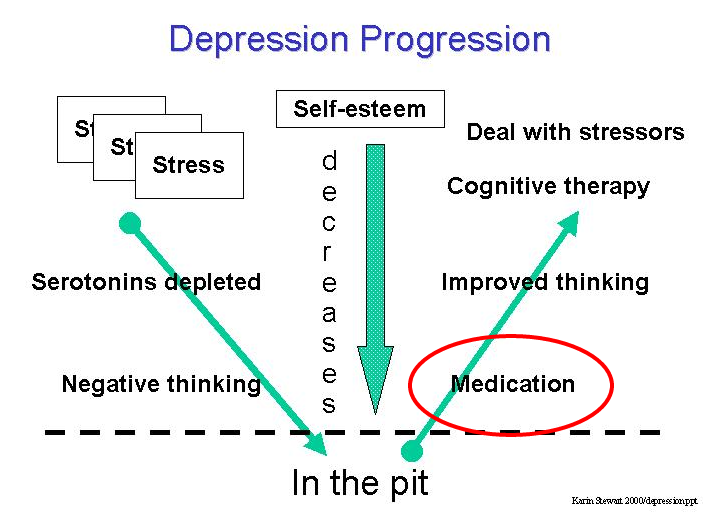 So now you’ve seen the doctor and been prescribed medication. That’s terrific, you’ve started your journey out of the pit! That doctor’s visit is the wisest decision you could have made.
So now you’ve seen the doctor and been prescribed medication. That’s terrific, you’ve started your journey out of the pit! That doctor’s visit is the wisest decision you could have made.
You probably have some very important questions to ask about medication, so let me answer some of the most common questions.
Aren’t anti-depressants just ‘happy pills’?
Definitely not! They don’t take away the knocks that hit you, but they will keep your serotonin level normal, making your mood normal. This gives you the chance to work on your problems while your mind is thinking normally. Sorting out the emotional side of depression is very stressful but worth it in the long run. Medication will definitely help with this.
So many people seem to be against anti-depressants, what do you think?
You really don’t need to tell everyone you’re on anti-depressants. You don’t tell the world about your blood pressure tablets or most other tablets. Let’s face it there are many unsympathetic people out there who might say hurtful things. By all means tell a kind friend who wants to help you.
How long until I feel better?
It will take at least two weeks, probably three weeks, before you start feeling a bit better, with your thoughts becoming a bit more normal. However, you might feel so relieved to feel better that you throw out the pills. ‘Yippee, I’m cured’, I can hear you shout! Sorry to say it, but you’re not cured yet! It’s the pills that are making you feel better and without the pills, it won’t be long before you slip down that slippery slope again. It’s a bit like being thirsty. A sip of water might take away your initial thirst but you need a glass of water to properly quench your thirst. Likewise your brain needs at least 6 months of medication to ‘quench your serotonin thirst’.
Are anti-depressants addictive?
No, anti-depressants are NOT addictive. Tranquilizers are and should be taken with care. You will NOT get addicted to your anti-depressants and your doctor will advise you on the best way of cutting down your dose when you are better.
How long must I stay on medication?
The first time you’re on medication stay on it for between 6-9 months so that the serotonin level can be properly restored. The second time you’re on medication you’ll probably need to stay on for about a year. After a third breakdown you’ll possibly need to be on a life long maintenance dose. Don’t despair; rather be thankful to the huge advancements in medical science. There are a large number of anti-depressants, there will definitely be one that will suit you. Listen to your doctor’s advice.
Can I mix homeopathic and pharmaceutical medication?
To put it bluntly, the answer is a definite NO! Do not mix homeopathic or naturopathic medication with pharmaceutical medication as there can be an allergic reaction. People have died from taking a combination of Prozac and St. John’s Wort. I must emphasize again the importance of working with your doctor to get better. The doctor will also assess any other meds you might be taking to ensure no adverse effects. Read the instruction list inside the box of pills. Something like St. John’s Wort is only suitable for treating mild depression
Can I overcome depression without medication?
Some people just don’t want to take tablets. If you’re in the pit of depression, you are going to struggle. Without medication the serotonin levels can take about 3 years to properly replenish. During that time just think about all the damage that can happen in your life because of the low self-esteem that results from depression.
Ask yourself if the reasons you are so against medication are really valid or just a general ‘anti-medication’ sentiment that you have learnt maybe from parents.
The only real way of overcoming depression without medication is to learn to change the way you think and the way you deal with stress, which is dealt with in the article called Cognitive Therapy.
What about self-medication – good idea or bad idea?
Many people use alcohol, drugs, and flirting with the opposite sex to self-medicate. All of these are substitutes for real psychological health and it’s really a bad idea to replace depression with one of these other problems.
What about alcohol to make me feel better!
Another bad idea! Many people with an alcohol problem are actually self-medicating for depression. Alcohol initially increases the serotonin level in the brain resulting in a ‘happy’ mood. The downside is the next day when the serotonin level drops to an all time low. How do you remedy this? With more alcohol as this boosts the serotonin level again.
But… who really wants to be treated for alcoholism as well as depression. Rather seek out therapy. Abusing alcohol while taking anti-depressants is not recommended – take a look at the insert in your medication box. It will probably tell you to avoid alcohol.
Hang in there! Work with your doctor and say how the medication is affecting you. That’s the only way the doctor will know if
you’re getting better. You might be lucky with the first medication you get but if you have side effects talk to your doctor, as there’ll definitely be one that agrees with you. Unfortunately doctors often don’t suggest therapy, but I think this is also very important. A combination of cognitive therapy and medication is regarded as the most successful way of treating depression.
SELF-ESTEEM
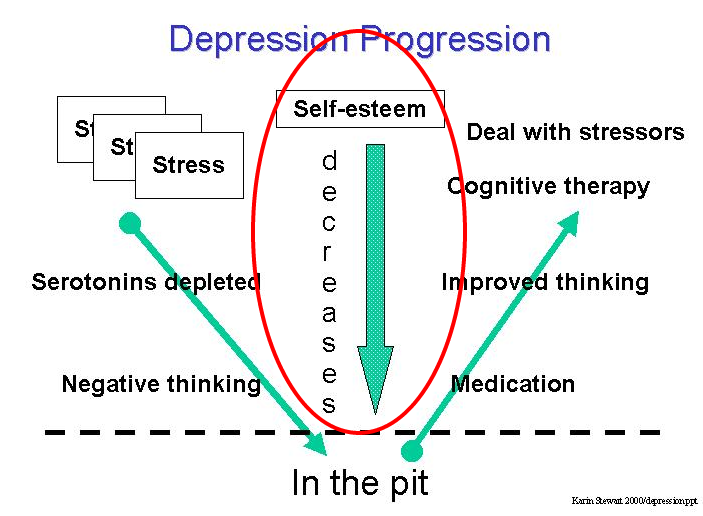 One of the biggest blows during depression is the loss of self-esteem and sense of self worth. Confidence takes a down ward plummet. This, very unfortunately, is part of depression resulting from the lack of serotonin and the negative thinking. Don’t buy into this idea of having no worth because then you just let it take root, making the situation worse. The next time the thought comes into your head that you’re worthless, talk back to that voice, tell it to take a hike!. Listen to the ‘best friend voice’ in you rather than believing that ‘worst enemy voice’ to be the truth. Be kind to yourself as you would be to a friend. We can be very hard on ourselves at times.
One of the biggest blows during depression is the loss of self-esteem and sense of self worth. Confidence takes a down ward plummet. This, very unfortunately, is part of depression resulting from the lack of serotonin and the negative thinking. Don’t buy into this idea of having no worth because then you just let it take root, making the situation worse. The next time the thought comes into your head that you’re worthless, talk back to that voice, tell it to take a hike!. Listen to the ‘best friend voice’ in you rather than believing that ‘worst enemy voice’ to be the truth. Be kind to yourself as you would be to a friend. We can be very hard on ourselves at times.
Our behavior matches our self-esteem
If you think you’re worthless you’ll behave in a way that matches this. It’s called a self-fulfilling prophecy. Think about it. Turn the tables by acting self-confident. People will then respond to you as if you were a confident person. This will have a ripple effect and your self-esteem will go up.
Let’s think a moment about worth. Everyone has the exact same worth just because we’re created beings with a place on this planet. That means the street beggar and the company CEO has the same worth. In this world we so often get our sense of esteem from our looks, our wealth, our status, the type of car we drive or our job position. This really makes no sense. We don’t judge a baby as being worthless because it has a nil bank balance. Nor do we judge someone like Mother Teresa as worthless. She too had none of these worldly things. We just need to look at the many superstars like Elvis, Marilyn Munroe and Freddy Mercury, who had all the material things the world could offer, but they died lonely, unhappy people.
Don’t link your self-worth or the worth of others to material things. With time your looks will fade and your bank balance may diminish through no fault of your own. Some people have their sense of worth so tied up with their work that their sense of purpose is lost when they retire. Statistically it has been shown that some people even die within 6 months of retirement because they have lost their purpose in life. They give up the will to live.
Click here for a fuller article on achieving good self-esteem.
DEALING WITH STRESSORS
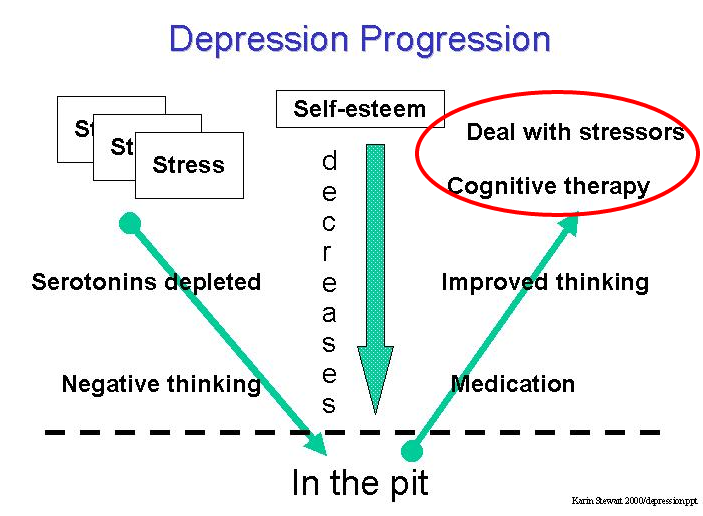 Dealing with stress involves changing how you think about life situations. As I’ve mentioned several times, the basic principle in cognitive therapy is that depression or anxiety is caused by your thoughts. By learning to change how you think and learning to deal with stress, you can stop the depression cycle from reoccurring or at the least stop it before you fall into the pit again. Want to do this? I cover this in my article called Cognitive Therapy.
Dealing with stress involves changing how you think about life situations. As I’ve mentioned several times, the basic principle in cognitive therapy is that depression or anxiety is caused by your thoughts. By learning to change how you think and learning to deal with stress, you can stop the depression cycle from reoccurring or at the least stop it before you fall into the pit again. Want to do this? I cover this in my article called Cognitive Therapy.
A word of encouragement.
Well done! You’ve read this far so you are obviously taking your journey of recovery seriously. Best wishes as you continue in this exciting journey called life!

